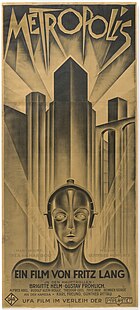
Back Metropolis (cinta) AN متروبوليس (فيلم 1927) Arabic متروبوليس (فيلم 1927) ARZ Metropolis (film, 1927) AZ Метраполіс BE Метрополис (филм) Bulgarian Metropolis (pel·lícula) Catalan Metropolis Czech Metropolis (ffilm 1927) CY Metropolis (film) Danish
| Metropolis | |
|---|---|
 Theatrical release poster by Heinz Schulz-Neudamm | |
| Directed by | Fritz Lang |
| Screenplay by | Thea von Harbou |
| Based on | Metropolis (1925 novel) by Thea von Harbou |
| Produced by | Erich Pommer |
| Starring | |
| Cinematography | |
| Music by | Gottfried Huppertz |
Production company | |
| Distributed by | Parufamet |
Release date |
|
Running time | 153 minutes (Original German release) |
| Country | German Reich |
| Languages |
|
| Budget | 5.3 million ℛ︁ℳ︁ (estimated)[2] (equivalent to €21 million 2021) |
| Box office | 75,000 ℛ︁ℳ︁ (estimated), $1 million (U.S. and Canada rentals)[3] |
Metropolis is a 1927 German expressionist science-fiction silent film directed by Fritz Lang and written by Thea von Harbou in collaboration with Lang[4][5] from von Harbou's 1925 novel of the same name (which was intentionally written as a treatment). It stars Gustav Fröhlich, Alfred Abel, Rudolf Klein-Rogge, and Brigitte Helm. Erich Pommer produced it in the Babelsberg Studio for Universum Film A.G. (UFA). Metropolis is regarded as a pioneering science-fiction film, being among the first feature-length ones of that genre.[6] Filming took place over 17 months in 1925–26 at a cost of more than five million Reichsmarks,[7] or the equivalent of about €21 million.
Made in Germany during the Weimar period, Metropolis is set in a futuristic urban dystopia and follows the attempts of Freder, the wealthy son of the city master, and Maria, a saintly figure to the workers, to overcome the vast gulf separating the classes in their city and bring the workers together with Joh Fredersen, the city master. The film's message is encompassed in the final inter-title: "The Mediator Between the Head and the Hands Must Be the Heart".
Metropolis met a mixed reception upon release. Critics found it visually beautiful and powerful – the film's art direction by Otto Hunte, Erich Kettelhut, and Karl Vollbrecht draws influence from opera, Bauhaus, Cubist, and Futurist design,[8] along with touches of the Gothic in the scenes in the catacombs, the cathedral and Rotwang's house[9] – and lauded its complex special effects, but accused its story of being naive.[10] H. G. Wells described the film as "silly", and The Encyclopedia of Science Fiction calls the story "trite" and its politics "ludicrously simplistic".[9] Its alleged communist message was also criticized.[11]
The film's long running time also came in for criticism. It was cut substantially after its German premiere. Many attempts have been made since the 1970s to restore the film. In 1984, Italian music producer Giorgio Moroder released a truncated version with a soundtrack by rock artists including Freddie Mercury, Loverboy, and Adam Ant. In 2001, a new reconstruction of Metropolis was shown at the Berlin Film Festival. In 2008, a damaged print of Lang's original cut of the film was found in a museum in Argentina. According to the explanation in the restored film, "the material was heavily damaged and, because it had been printed on 16mm film stock, does not have the full-aperture silent picture ratio" and "in order to maintain the scale of the restored footage, the missing portion of the frame appears black" while "black frames indicate points at which footage is still lost". After a long restoration process that required additional materials provided by a print from New Zealand, the film was 95% restored and shown on large screens in Berlin and Frankfurt simultaneously on 12 February 2010.
Metropolis is now widely regarded as one of the greatest and most influential films ever made, ranking 67th in Sight and Sound's 2022 critics' poll, and receiving general critical acclaim.[12] In 2001, the film was inscribed on UNESCO's Memory of the World Register, the first film thus distinguished.[13] On 1 January 2023, the film's American reserved copyright expired, thereby entering the film into the public domain.[14]
- ^ Kreimeier 1999, p. 156.
- ^ a b Bennett, Bruce (2010) "The Complete Metropolis: Film Notes" Kino DVD K-659
- ^ Cohn, Lawrence (15 October 1990). "All Time Film Rental Champs". Variety. p. M-172. ISSN 0042-2738.
- ^ Magid 2006, p. 129.
- ^ Grant 2003, p. 14.
- ^ "Metropolis (1927)" Archived 10 October 2017 at the Wayback Machine Science Fiction Film History. Retrieved 15 May 2013. Quote: "Although the first science fiction film is generally agreed to be Georges Méliès' A Trip To The Moon (1902), Metropolis (1926) is the first feature length outing of the genre."
- ^ Hahn, Ronald M.; Jansen, Volker (1998). Die 100 besten Kultfilme (in German). Munich, Germany: Heyne Filmbibliothek. p. 396. ISBN 3-453-86073-X.
- ^ McGilligan 1997, p. 112.
- ^ a b Brosnan, Joan and Nichols, Peter. "Metropolis". In Clute, John and Nicholls, Peter (eds.) (1995). The Encyclopedia of Science Fiction. New York: St.Martin's Griffin. p. 805. ISBN 0-312-13486-X
- ^ McGilligan 1997, p. 130.
- ^ McGilligan 1997, p. 131.
- ^ "The Greatest Films of All Time". Sight & Sound. British Film Institute. Retrieved 19 September 2022.
- ^ Staff (ndg) "Memory of the World: Metropolis – Sicherungsstück Nr. 1: Negative of the restored and reconstructed version 2001" UNESCO website. Accessed: 5 November 2018
- ^ "What's Entering the Public Domain in 2023: Fritz Lang's Metropolis, Virginia Woolf's to the Lighthouse, Franz Kafka's Amerika & More | Open Culture".